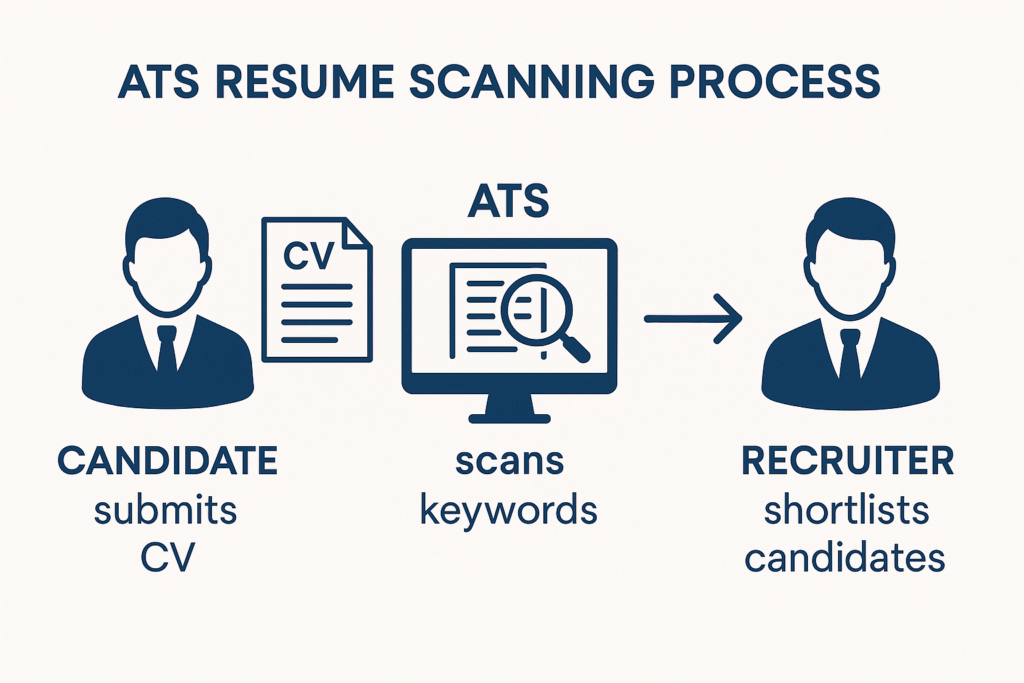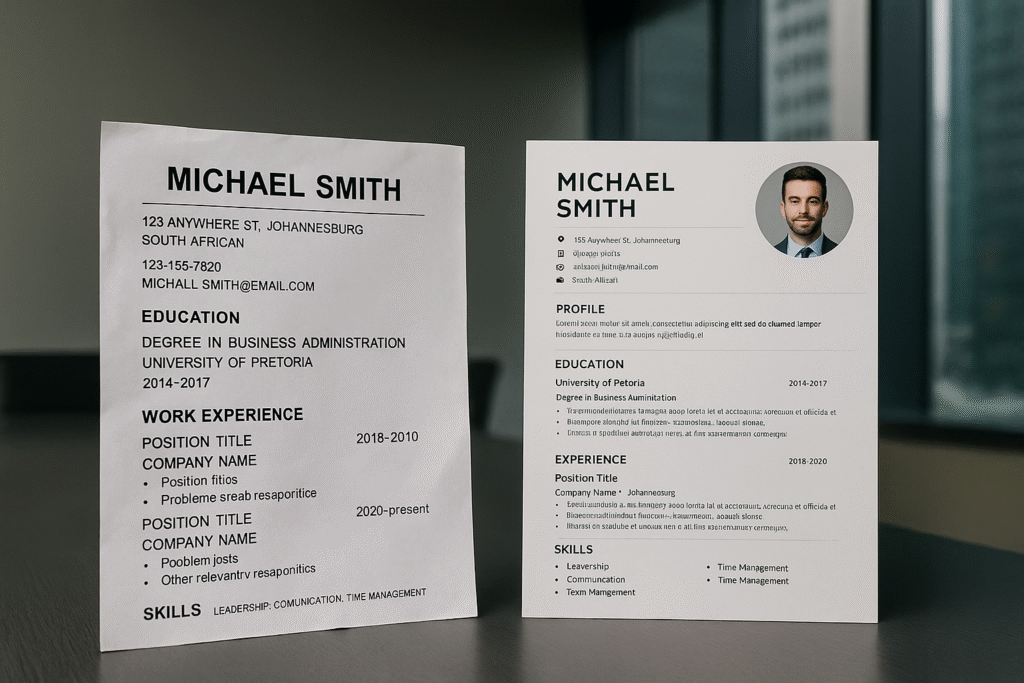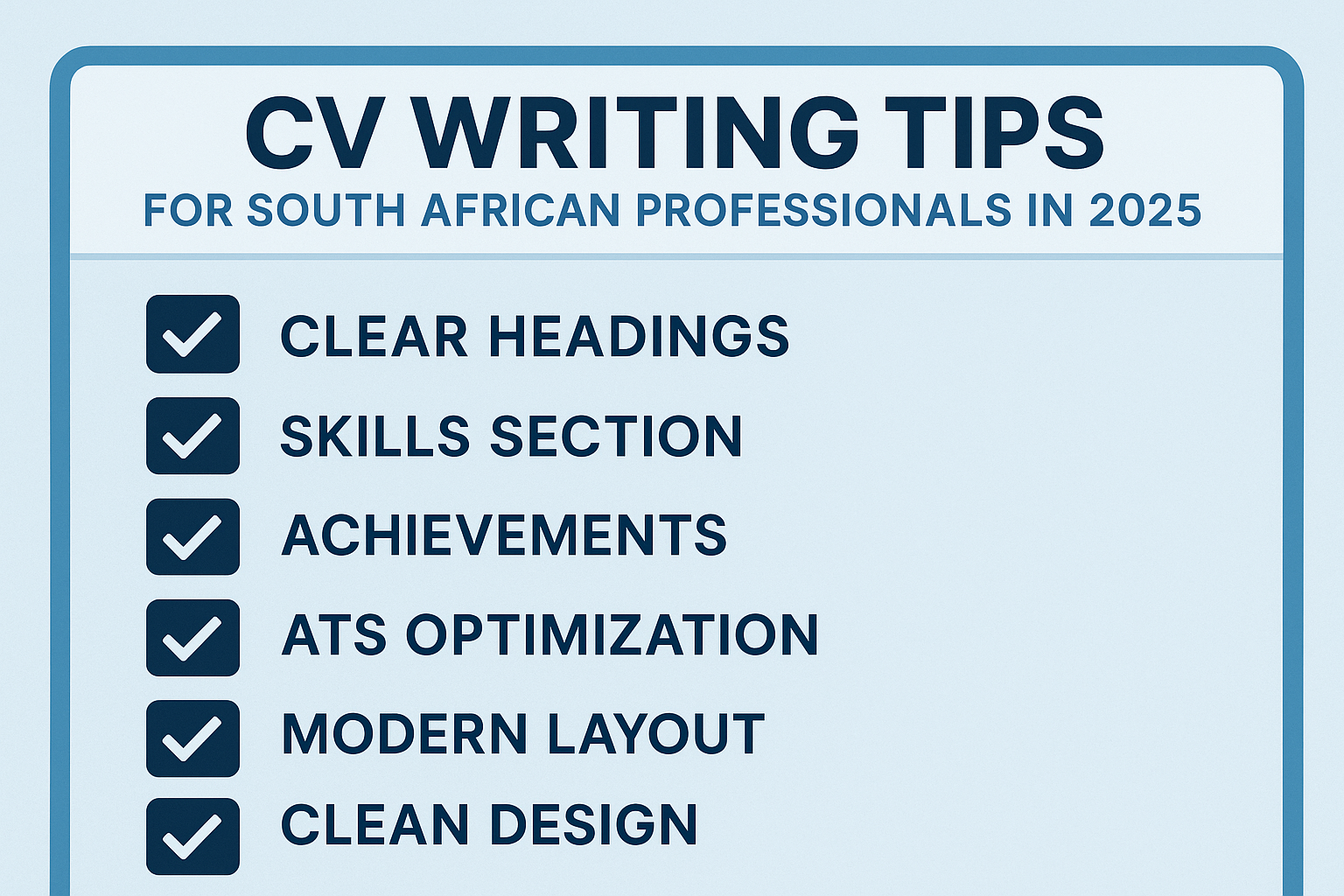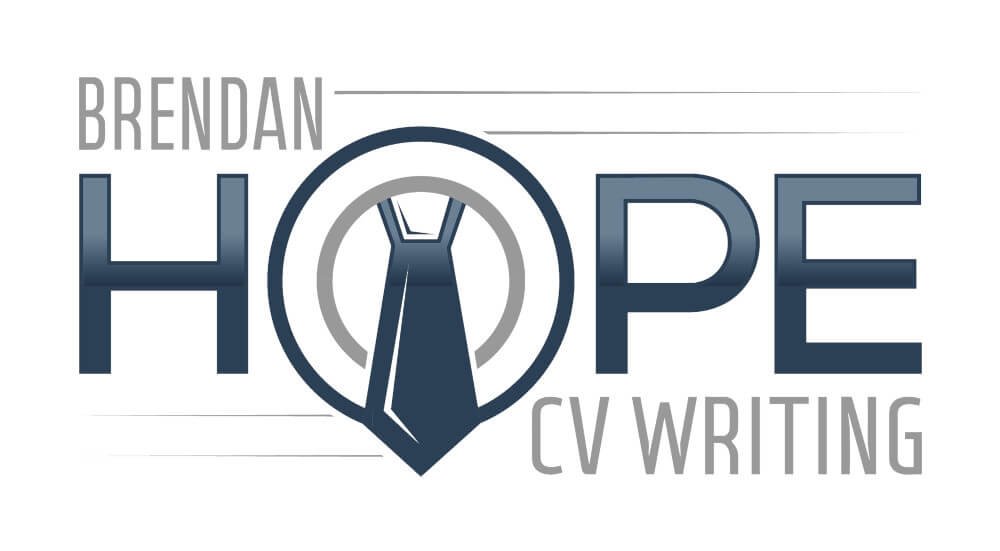1. Introduction
In South Africa’s ever-evolving job market, your CV is more than just a summary of your experience, it’s your passport to career advancement. As we head into 2025, employers increasingly rely on digital recruitment tools, automation, and applicant tracking systems (ATS) to identify top candidates. This makes a professionally written, well-optimised CV more important than ever before.
Whether you’re a recent graduate, a mid-career professional, or an executive looking to make your next move, having a high-impact CV tailored for the South African and international markets is essential. With thousands of job seekers competing for top roles, standing out starts with how your CV reads, looks, and performs in automated systems.
This comprehensive guide, backed by the expertise of Brendan Hope CV Writing is designed to equip you with everything you need to create a CV that gets results in 2025. From understanding how ATS works to tailoring your CV for each application, we’ll walk you through practical strategies and insider tips to help you move confidently toward your career goals.
Table of Contents
- 1. Introduction
- 2. Why Your CV Matters More Than Ever
- 3. Key Elements of a Modern CV (2025 Edition)
- 4. Understanding ATS and Keyword Optimisation
- 5. Top CV Formats for Different Career Stages
- 6. Common CV Mistakes to Avoid in 2025
- 7. How to Tailor Your CV for Each Job Application
- 8. Executive-Level CV Strategies
- 9. CV Tips for Graduates and Entry-Level Job Seekers
- 10. International CV Writing Tips (UK, Canada, Australia)
- 11. LinkedIn Profile Alignment
- 12. The Role of Cover Letters in 2025
- 13. CV Design and Layout Tips for 2025
- 14. Where and How to Use Your CV
- 15. Why Consider a Professional CV Writing Service?
- 16. Conclusion
- 17. FAQs
2. Why Your CV Matters More Than Ever
In 2025, the South African job landscape will be more competitive and digitally driven than ever before. As companies streamline their hiring processes through technology and automation, your CV has become the most critical document in your job search journey.
Rising Competition in a Post-Pandemic Market
With a growing number of professionals seeking new opportunities, whether due to career pivots, retrenchments, or emigration, employers are often inundated with hundreds of applications per vacancy. This means your CV must immediately communicate your value and relevance to stand a chance of being shortlisted.
The 6-Second Rule
Recruiters and hiring managers spend as little as six seconds scanning a CV before deciding if it warrants further attention. If your document lacks clear structure, impactful language, or job-specific keywords, it’s likely to be overlooked, even if you’re highly qualified.
ATS: The Gatekeeper of Job Applications
More South African companies, especially mid to large-sized firms, are now using Applicant Tracking Systems (ATS) to streamline candidate selection. These systems filter CVs based on keyword relevance and formatting. A visually appealing but poorly optimised CV may never reach a human recruiter.
This is why enlisting the help of a professional CV writer in South Africa is no longer a luxury, it’s a strategic career move that can significantly improve your chances of landing interviews.
3. Key Elements of a Modern CV (2025 Edition)
A winning CV in 2025 needs to be more than a chronological list of roles, it must be strategically designed, keyword-optimised, and aligned with your personal brand. Whether you’re targeting roles locally or abroad, the structure of your CV plays a key role in how recruiters and ATS platforms interpret your value.
Contact Information
Start with your full name, professional email address, phone number, and location (city & province). Adding your LinkedIn profile URL is essential, as most employers cross-reference this for additional validation.
Professional Summary
A concise 3–5 line profile at the top of your CV that summarises who you are, your top achievements, and what you’re seeking next. This is your “elevator pitch” to hook recruiters right away.
Work Experience with Impact
List roles in reverse chronological order. Include your title, company, location, and dates for each job. More importantly, describe your key responsibilities followed by quantifiable achievements (e.g., “Increased sales by 45% YoY”). Use bullet points for clarity and avoid dense paragraphs.
Education and Certifications
Include degrees, diplomas, certificates, and any professional accreditations. List the institution name, qualification title, and date of completion. Recent graduates should place this section before work experience.
Skills Section
Divide this into two parts: Technical Skills (e.g., Excel, Salesforce, AutoCAD) and Hard/Soft Skills (e.g., leadership, communication, problem-solving). This helps both human readers and ATS algorithms quickly assess your suitability.
Optional but Valuable Sections
- Languages: Especially important in multilingual regions or international applications.
- Awards & Recognitions: Prove your excellence with accolades.
- Publications or Projects: Great for academics, creatives, and tech professionals.
By including these key elements and tailoring them to your industry and role type, your CV will be equipped to make a powerful first impression in the modern job market.
4. Understanding ATS and Keyword Optimisation

Many South African job seekers are unaware that their CVs are often screened by software before a human ever lays eyes on them. These programs, known as Applicant Tracking Systems (ATS), play a critical role in modern recruitment. If your CV isn’t optimised for ATS, it may never make it past the first hurdle.
What is an ATS?
An ATS is a digital tool used by recruiters and companies to manage job applications. It scans each CV for keywords, job titles, qualifications, and other data points that match the job listing. Based on its algorithm, it ranks candidates and filters out those that don’t meet the criteria.
How ATS Affects South African Job Seekers
Increasingly, both local and international South African companies, especially in sectors like finance, tech, healthcare, and government, rely on ATS platforms. If your CV isn’t formatted correctly or lacks relevant keywords, it could be automatically rejected, regardless of your qualifications.
How to Optimize Your CV for ATS
- Use Standard Job Titles: Avoid overly creative job names. Stick to what’s common in the industry (e.g., “Marketing Manager” vs. “Brand Ninja”).
- Mirror Keywords from the Job Ad: Study the job description and include relevant terms such as required skills, certifications, and tools.
- Avoid Tables, Text Boxes, and Headers/Footers: ATS often can’t read complex formatting. Keep the layout simple and clean.
- Use Bullet Points: Bullet points are ATS-friendly and make your accomplishments easy to scan.
- Submit as a .docx or PDF (if specified): Some older ATS platforms don’t read PDFs well, follow the employer’s submission instructions carefully.
To ensure your CV clears ATS filters and reaches the recruiter’s desk, consider investing in a professionally ATS-optimised CV from Brendan Hope, crafted by writers who understand the nuances of South African and international hiring systems.
5. Top CV Formats for Different Career Stages
Your CV format plays a major role in how your experience and strengths are perceived. Choosing the right structure ensures that your most relevant skills and achievements are highlighted effectively, both to recruiters and ATS software. Below are the most effective formats for various career stages in 2025.
Chronological CV
This is the most common format and works well for professionals with a steady work history. It lists work experience in reverse chronological order, starting with your most recent job. Ideal for showcasing growth and industry expertise, it’s perfect for mid-level and senior professionals in South Africa.
Functional CV
Also known as a skills-based CV, this format emphasises your core competencies rather than your work timeline. It’s best suited for career changers, individuals with employment gaps, or those shifting industries. Use this format to draw attention to transferable skills and accomplishments.
Combination CV (Recommended for 2025)
This hybrid format blends the best of both worlds, skills and experience. It starts with a powerful summary and skills section, followed by a concise work history. It’s highly versatile and ATS-friendly, making it the go-to choice for most professionals in today’s job market.
Graduate/Student CV
For entry-level job seekers or recent graduates, a tailored student CV should focus on education, internships, part-time work, and volunteer experience. Highlight achievements in projects or coursework relevant to the job. Keep the layout clean and focused on potential rather than experience.
Choosing the right CV format is crucial to the effectiveness of your application. If you’re unsure which structure suits your career stage, book a free introductory consultation with Brendan Hope for expert guidance tailored to your goals.
6. Common CV Mistakes to Avoid in 2025

Even the most qualified candidates can lose job opportunities because of preventable CV errors. In 2025, with increased reliance on technology and rising recruiter expectations, avoiding these common mistakes can significantly improve your chances of landing an interview.
Using a Generic CV for All Applications
One of South African job seekers’ biggest mistakes is submitting the same CV to multiple roles. Recruiters can instantly spot a generic document. Each application should be tailored to the job description, highlighting the most relevant skills and experiences.
Overuse of Graphics and Design Elements
While visually striking CVs might catch the eye, they often confuse ATS systems. Avoid templates that rely on columns, icons, charts, or graphics that may not be machine-readable. Instead, use a clean, professional format that balances aesthetics with functionality.
Lack of Quantifiable Achievements
Employers want to see your impact, not just your responsibilities. Statements like “Managed a sales team” are far less compelling than “Led a sales team of 8 to exceed revenue targets by 35% in Q2 2024.” Use metrics and results wherever possible.
Poor Grammar, Spelling, and Typos
A single typo can leave a lasting impression that suggests a lack of attention to detail. Always proofread your CV or use a professional service like Brendan Hope CV Writing to ensure your document is error-free and polished to perfection.
Too Long or Too Short
Generally, a CV should be no more than two pages unless you apply for an academic, medical, or executive position. Graduate CVs should typically stay within one page. Keep your content concise and relevant.
By steering clear of these common pitfalls, you’ll position yourself as a serious, well-prepared candidate who understands what today’s employers are truly looking for.
7. How to Tailor Your CV for Each Job Application
One-size-fits-all CVs rarely make the cut in today’s competitive job market. Customising your CV for each application shows hiring managers that you’ve taken the time to understand their needs, and that you’re a strong fit for the role. In 2025, personalisation is key to making your CV stand out.
Start with Research
Before updating your CV, thoroughly review the job advertisement. Pay close attention to the listed requirements, responsibilities, and keywords. Visit the employer’s website to understand their values and tone. This will help you align your content with their expectations.
Mirror the Language of the Job Description
Use similar terminology, especially in your profile summary and skills section. For example, if a job ad emphasises “strategic planning” and “cross-functional collaboration,” include these phrases naturally in your CV, especially if you’ve had experience in those areas.
Highlight Relevant Achievements
Shift the emphasis of your work experience to highlight accomplishments most relevant to the role. If you’re applying for a project management role, bring forward examples of timelines met, budgets managed, or teams led, even if these were secondary aspects of your past job.
Adjust Your Profile Statement
Your opening summary should reflect what you bring to this role. It’s your opportunity to connect the dots between your background and the employer’s needs. This section should change slightly with each application.
Update the Skills Section
Tailor this area to reflect the core competencies listed in the job ad. Include a balance of technical and soft skills relevant to the position. Be honest, never list skills you can’t confidently back up.
If you want help tailoring your CV professionally for different roles or industries, consider scheduling a free consultation with Brendan Hope for personalised advice and a custom strategy.
8. Executive-Level CV Strategies
A standard CV won’t cut it for directors, senior managers, and C-suite professionals in South Africa. At this level, your CV must reflect strategic influence, leadership capabilities, and tangible business results. It should be designed to position you as a candidate and a valuable asset to the organisation.
Showcase Strategic Impact
Executive CVs should highlight decisions that drove growth, improved operational efficiency, led transformations, or shaped company direction. Replace task-based language with outcome-driven accomplishments. For example: “Led digital transformation that reduced operating costs by 22% over 18 months.”
Quantify Achievements at Scale
Numbers are crucial. Use metrics to demonstrate your impact, revenue generated, headcount managed, budgets handled, and performance improvements. These give hiring boards confidence in your leadership capability.
Incorporate Executive-Level Language
Use concise, confident, and industry-specific terminology that reflects senior-level communication. Avoid generic descriptors; instead, opt for phrases like “P&L ownership,” “enterprise-level change management,” or “board engagement.”
Include Supplementary Documents
Executives may also benefit from submitting supporting documents such as:
- Executive Biographies: One-page narrative summaries used for board or media introductions.
- Board CVs: Tailored documents for non-executive director roles.
- Leadership Statements: Concise outlines of leadership philosophy and accomplishments.
Use a Premium Design Format
At the executive level, presentation matters. Your CV should be sleek, formal, and aligned with corporate branding standards. Avoid loud colours or experimental layouts. A professionally designed executive CV helps establish credibility before you even speak to a hiring committee.
If you’re aiming for board-level or high-impact leadership positions, Brendan Hope’s Gold Package includes in-depth strategy consultations and bespoke content tailored to your leadership brand.
9. CV Tips for Graduates and Entry-Level Job Seekers
Starting your career can be daunting, especially in a competitive job market like South Africa’s. But even without years of experience, a well-crafted CV can set you apart. As a graduate or early-career professional, your goal is to showcase potential, motivation, and transferable skills.
Lead with Education and Qualifications
Place your education section above work experience, especially if you’ve recently graduated. Include your degree or diploma, institution, graduation year, and academic achievements or awards. Mention relevant modules, thesis topics, or projects if they apply to the job you’re targeting.
Include Internships, Part-Time Roles, and Volunteer Work
These experiences are invaluable, even if unpaid. They demonstrate initiative, responsibility, and your ability to apply knowledge in real-world contexts. Clearly state your contributions and the skills gained, such as teamwork, problem-solving, or time management.
Highlight Soft Skills
Employers hiring graduates often focus on soft skills like communication, adaptability, leadership, and a willingness to learn. Back these up with real-life examples from academic projects, campus societies, or community service initiatives.
Use Strong Action Verbs
Start bullet points with dynamic verbs like “Organised,” “Led,” “Initiated,” or “Created.” This makes your CV more engaging and positions you as proactive and confident.
Tailor Your CV for Each Role
Tailoring is essential even at entry level. Match your skills and experience to the job description and industry. Use relevant keywords to pass ATS filters and speak directly to what the employer is looking for.
Brendan Hope’s Graduate CV Package is specifically designed for South African students and recent graduates. It provides tailored guidance and professionally written documents to help you launch your career on the right foot.
10. International CV Writing Tips (UK, Canada, Australia)
If you plan to emigrate or apply for roles abroad, your South African CV may need adjustments to meet international standards. Countries like the UK, Canada, and Australia each have specific expectations regarding CV structure, tone, and content. Adapting your application can significantly improve your chances of landing interviews overseas.
Know the Key Differences
- UK: Commonly uses the term “CV” and prefers a two-page format. No photos, age, or personal details. Focus on professionalism, clarity, and achievements.
- Canada uses the term “résumé” interchangeably with CV. It Emphasises results, achievements, and clarity. In style and content expectations, Canada is similar to the U.S.
- Australia: Often accepts both one and two-page CVs. Prefers concise summaries of achievements with clear section headings and accurate employment dates.
Focus on Global Keywords
When applying internationally, match your language and keywords with the job market. For example, “Matric” should be replaced with “High School Diploma” in a Canadian résumé. Also, be mindful of spelling differences, UK English vs. U.S. English.
Adapt for Global ATS Systems
Just like South African companies, international employers use ATS to screen CVs. It’s essential to ensure your formatting is clean and your CV is rich with job-specific keywords. Avoid localised jargon that may not translate abroad.
Prepare Supporting Documents
Some countries require additional documentation:
- Cover letters: Almost always expected in the UK, Canada, and Australia.
- Reference letters: May be requested upfront or during later stages.
- Visa information: If you already have the right to work, mention it clearly.
For professionals planning to work internationally, Brendan Hope offers globally tailored CV writing services to ensure your documents meet destination-specific standards and stand out to foreign recruiters.
11. LinkedIn Profile Alignment
In 2025, your LinkedIn profile is just as important as your CV, if not more so. Recruiters, hiring managers, and even automated tools routinely cross-check your CV against your LinkedIn profile to verify consistency and gain deeper insights into your professional brand. In South Africa and beyond, having a polished LinkedIn presence is no longer optional.
Ensure Consistency Between CV and LinkedIn
Your job titles, employment dates, and major accomplishments should match those on your CV. Inconsistencies may raise red flags during background checks or interviews. Use LinkedIn to expand on your CV by adding context, multimedia, or project links where relevant.
Optimise the “About” Section
This is your chance to tell your professional story. Use a conversational yet professional tone to highlight your career journey, key skills, and what you’re looking for next. Incorporate relevant keywords to improve searchability by recruiters using LinkedIn’s talent tools.
Use a Professional Photo and Banner
Your photo should be high-quality, friendly, and suitable for your industry. Avoid selfies or casual pictures. Consider also adding a custom banner that reflects your field or personal brand, this helps you stand out visually.
Get Active on the Platform
LinkedIn rewards active users. Regularly share content, comment on industry updates, and engage with your network. These activities increase your visibility and can lead to valuable job leads and referrals.
Request Recommendations
Ask former colleagues, managers, or clients to write you LinkedIn recommendations. These serve as social proof and enhance your credibility, especially when transitioning careers or applying for leadership roles.
If you’re unsure how your LinkedIn profile compares to industry standards, Brendan Hope’s CV and LinkedIn optimisation packages offer tailored support to ensure your online presence works with your CV to attract top employers.
12. The Role of Cover Letters in 2025
While CVs take center stage in job applications, cover letters remain a powerful supporting document, especially when applying for roles in 2025’s competitive South African and global markets. A well-written cover letter can introduce your personality, explain career transitions, and highlight your motivation in ways your CV cannot.
When You Need a Cover Letter
Though not always explicitly required, a cover letter is expected in many professional and executive roles. It’s especially important when:
- You’re applying to a company directly (without a recruiter).
- The job ad requests it.
- You’re changing industries or have employment gaps to explain.
- You want to express enthusiasm for the specific organisation or mission.
What to Include in a 2025-Ready Cover Letter
Your cover letter should be concise (no longer than one page) and follow a professional structure:
- Opening Paragraph: Mention the job you’re applying for and where you found it. Capture attention with a strong lead.
- Middle Paragraphs: Highlight relevant skills, experiences, and why you’re a great fit. Personalise it to the employer’s needs.
- Closing Paragraph: Express enthusiasm, thank the reader, and include a call-to-action (e.g., “I welcome the opportunity to interview…”).
Common Mistakes to Avoid
Avoid using templates that feel generic or impersonal. Don’t repeat your CV verbatim. Instead, use the space to show genuine interest and alignment with the company’s values or goals. If possible, always address the letter to a specific person.
Need help crafting a compelling cover letter that complements your CV? Explore Brendan Hope’s Cover Letter Writing Services, designed to ensure every element of your job application package works cohesively to get you hired.
13. CV Design and Layout Tips for 2025
In 2025, first impressions are often digital and visual. While your content matters most, the design and layout of your CV significantly impact readability, professionalism, and how well it performs in both human and ATS reviews. A well-designed CV creates a sense of structure, confidence, and clarity, qualities every employer values.
Keep It Clean and Professional
Stick to a clean, minimalist layout with clear section headings, uniform spacing, and consistent formatting. Avoid cluttered designs or unprofessional fonts. White space is your friend, it helps recruiters easily scan your CV.
Use Readable Fonts
Stick to web-safe, professional fonts like Calibri, Arial, Helvetica, or Georgia. Use 10.5pt to 12pt for body text and slightly larger sizes (14pt–16pt) for section titles. Avoid script or decorative fonts that may reduce legibility or confuse ATS scanners.
Stick to One or Two Columns
Although creative formats with multiple columns may look modern, they can cause parsing errors in ATS software. A simple one-column or two-column layout with left-to-right reading flow is optimal for compatibility and clarity.
Use Bullet Points and Bold for Structure
Bullet points make your achievements easier to digest and increase scannability. Use bold text to draw attention to job titles, companies, and key achievements, but use it sparingly to avoid visual overload.
Highlight Key Sections Clearly
Include clear section headings such as “Professional Experience,” “Education,” “Certifications,” and “Skills.” If needed, use horizontal lines or subtle shading to divide content, but keep it ATS-friendly.
Be Mindful of Colours
For a professional tone, use a monochrome or two-colour scheme. Dark blue, charcoal, or muted accents work well. Avoid bright colours, neon highlights, or excessive use of graphics and icons.
Not sure if your current CV design is helping or hurting your application? Brendan Hope offers expertly formatted, modern CV templates that are visually appealing and fully ATS-optimised for South African and international employers.
14. Where and How to Use Your CV
Crafting the perfect CV is only the first step, knowing where and how to use it effectively is equally crucial. In 2025, South African job seekers must take a multi-channel approach, leveraging online and offline opportunities to increase visibility and land interviews.
Top South African Job Boards
Make sure your CV is uploaded to trusted platforms that employers frequently use to source talent:
- Careers24 – Popular across industries, especially entry to mid-level roles.
- Pnet – Focuses on professional and executive-level vacancies.
- Job Mail – Covers a wide range of industries with user-friendly filtering.
- Indeed South Africa – Aggregates listings from multiple sources, offering high visibility.
- LinkedIn Jobs – Ideal for professionals and networking-focused applications.
Direct Company Applications
Visit the “Careers” sections of company websites you’re interested in. Tailor your CV and cover letter to each company’s values and mission. Smaller businesses may not post jobs on boards but welcome direct submissions.
Recruitment Agencies
Registering with reputable recruitment agencies can give you access to unlisted or high-level positions. Build relationships with recruiters specialising in your industry and send them a polished, role-specific CV.
Networking and Referrals
Personal connections can be your strongest asset. Attend industry events (in-person or virtual), engage with LinkedIn groups, and let your network know you’re open to opportunities. A referred CV is more likely to be seen and considered seriously.
Follow Up Strategically
After submitting your CV, send a polite follow-up email or LinkedIn message within 5–7 business days. Reaffirm your interest and ask if you can provide any additional information.
Not sure where to start? Brendan Hope’s Job-Search Strategy Sessions help clients create tailored outreach plans and maximise the impact of their professionally written CVs across every channel.
15. Why Consider a Professional CV Writing Service?
With increasing competition and sophisticated recruitment systems in 2025, more South African job seekers are considering professional CV writing services to gain a competitive edge. A professionally written CV doesn’t just look better, it’s strategically structured, ATS-optimised, and tailored to highlight your value in a way that resonates with hiring managers.
Expertise and Personal Branding
Professional CV writers understand the nuances of different industries, job levels, and target markets. They know how to position your experience for maximum impact and ensure your unique value proposition is clear and compelling.
Save Time and Reduce Stress
An effective CV can be time-consuming and overwhelming, especially when applying for multiple roles. Outsourcing this task allows you to focus on preparing for interviews and networking, while professionals take care of the writing.
Up-to-Date with Hiring Trends
Recruitment practices evolve rapidly. A service like Brendan Hope CV Writing stays current with trends in ATS optimisation, LinkedIn strategies, remote hiring practices, and global formatting standards, ensuring your CV performs across all platforms.
Unlimited Revisions and Strategic Coaching
Unlike generic services, Brendan Hope offers packages that include one-on-one consultations, unlimited edits, and tailored coaching. This ensures that your documents evolve with your goals and are never “just templates.”
Proven Success Stories
Hundreds of clients from South Africa and abroad have landed interviews, career promotions, and international roles thanks to Brendan’s services. From graduates to executives, these testimonials highlight the impact of investing in expert help.
If you’re serious about accelerating your job search, consider partnering with Brendan Hope CV Writing for strategic guidance and world-class documents that help you stand out in every application.
16. Conclusion

In today’s hyper-competitive job market, your CV is more than just a document; it’s your career marketing tool. Whether you’re a fresh graduate, a mid-level professional, or an experienced executive, investing time and effort into crafting a CV that is tailored, well-designed, and ATS-optimised is no longer optional in 2025; it’s essential.
From understanding how recruiters think to leveraging platforms like LinkedIn and adapting for international markets, a strategic approach to your CV can open doors you didn’t know existed. The good news? You don’t have to do it alone.
Brendan Hope CV Writing offers a personalised, professional solution for South Africans ready to make their next career move with confidence. Whether you need a full CV overhaul, help navigating a career shift, or strategic guidance for international applications, support is just a click away.
Your next opportunity could be one great CV away. Don’t let outdated formatting, vague wording, or missed keywords hold you back. Take the first step today, book your free intro call and give your career the momentum it deserves.
17. FAQs
How long should a CV be in South Africa?
Ideally, your CV should be no longer than two pages for most roles. Graduates and early-career professionals can keep it to one page, while executives may require up to three pages depending on their experience and accomplishments.
Should I include references on my CV?
It’s not necessary to include references unless the job ad specifically requests them. Instead, use the line “References available on request” and prepare a separate reference sheet to provide when asked.
Do South African companies really use ATS?
Yes. Many mid- to large-sized companies, recruitment agencies, and even some SMEs in South Africa now use ATS to screen applications. Optimising your CV for ATS is essential for increasing visibility.
Is LinkedIn really necessary?
Absolutely. LinkedIn is a crucial tool in the 2025 job market. Recruiters use it to verify information, assess your personal brand, and evaluate your professionalism. A strong LinkedIn profile complements your CV and boosts your chances of being contacted for opportunities.
How often should I update my CV?
You should update your CV at least every 6–12 months, or immediately after a promotion, job change, certification, or major project completion. Keeping your CV current ensures you’re always ready to seize new opportunities as they arise.

